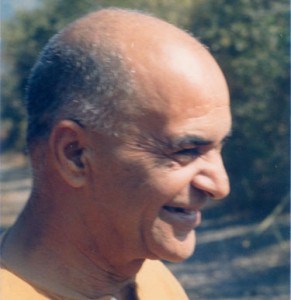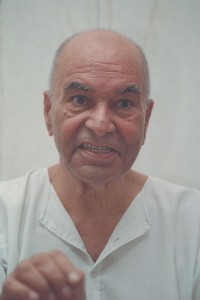The following dialogue, between myself and Papaji, has been taken from volume three of Nothing Ever Happened. It appeared in the chapter entitled ‘Guru and Disciple’.

David: I want to ask you some questions about the power of your word. Gurus tell their disciples, ‘You are Brahman,’ and if there is sufficient power and authority in the words, the disciple actually becomes Brahman and experiences it directly. I believe that you have this power and this authority, and on a few occasions you have confirmed that this is so.
One thought has often occurred to me. When you tell people, ‘Keep quiet,’ I don’t think that you are asking people to practise being quiet. I think that you are giving a direct order to their minds. If the mind obeys the order, silence ensues. Is this a correct interpretation?
Papaji: Yes. This is the traditional way. The Sadguru tells his disciple, ‘You are Brahman’. If the disciple is pure in mind, he listens to this authoritative statement and at once becomes Brahman itself. Then he himself affirms, ‘Aham Brahmasmi,’ ‘I am Brahman’. The Sadguru has the authority and power to make this statement in such a way that the disciple immediately experiences the truth of it.
In satsang, when I say to a person, ‘Keep quiet,’ that person automatically becomes quiet. If the mind is pure, it obeys the order ‘Keep quiet!’ by stopping all its thought processes. As soon as the thought processes stop, one reaches the source of one’s thought and stays there. When I see that this has happened, I say, ‘Don’t make any effort,’ because any effort you make in this moment takes you away from this place. The mind always wants to be doing something. When it goes back to its origin and experiences the peace and silence that is always there, there is a tendency to think about it and evaluate it. It is such a nice state, people who are new to it want to make some effort to stabilise it and perpetuate it. This is a guaranteed way to make it go away because it covers up the experience with more thoughts. So, when I see that someone is trying to hold onto the experience in any way, I tell them, ‘Don’t give rise to any thought whatsoever. Don’t stir a single thought in your mind.’ This is not a state of mind that can be maintained by thinking about it. It is a state of no-mind that will only remain if you don’t think about it in any way. I have found that these three instructions work very well. That is why I use them all the time.
People have this experience of no-mind here, and then they go back to their families and friends in the West. All these people want to know, ‘What has happened to you in Lucknow?’ I tell people, before they leave Lucknow, that if anyone asks them questions like this, they should reply by keeping quiet. If they can stay in that no-mind state when people ask them what they have brought, then all those people will come to know what it is that has been brought back from Lucknow. This quietness can only be preserved and maintained by not thinking about it in any way. Only a few people have managed to keep this quietness that they experienced here because most people try to hold onto it with their thoughts.
For several months during the middle of 1995 Papaji read vedantic texts during his satsangs. Yoga Vasishta, Panchadasi, Advaita Bodha Deepika, Ashtavakra Gita, and Ribhu Gita were read in their entirety. For the most part, he read them without comment, even though many of the teachings on sadhana seemed to be directly opposed to his own ‘no method, no practice’ approach.
Most of the texts recommended the traditional advaitic sadhana of sravana, manana and nididhyasana. Sravana is hearing the words of truth from a qualified Guru; manana is reflecting on them and generating a conviction that they are true; in nididhyasana one experiences the truth of the words directly. The second stage, manana, is traditionally pursued by studying vedantic texts with the aim of convincing oneself that the mind, the body and the world are not real. I had heard Papaji say that the word of the Guru alone is enough to grant liberation and that thinking about his teachings is actually an impediment to having a direct experience of them. There are many examples in the previous chapters of devotees suddenly becoming aware of their true nature after hearing a few words from Papaji. No thinking or reflection was required.
David: Almost all the books you have been reading in the last few months have mentioned the traditional path of sravana, manana and nididhyasana. The author of the Ribhu Gita repeatedly asserts that sravana – hearing the truth from the Guru – is enough and that there is no need to think about it or convince oneself that it is true. Do you agree with him?
Papaji: Yes, I do agree with him, and I will tell you why. When you hear the word of truth directly from the mouth of a true Guru, that word will directly enter the Heart of the one who is hearing it. This word from the Guru will dissolve there and itself become the Heart of the listener.
David: You often say that the truth is not something one should try to understand, and that the effort to comprehend is an impediment to having a direct experience of it. So, is the process of manana – reflecting on the Guru’s words and convincing oneself that they are true – an aid or an impediment?

Papaji: Understanding will not help you because truth cannot be understood. Whatever you can understand belongs to the past. If you understand something, what you understand cannot be the truth because the mind can never reach the truth. When it tries to reach it, it gets lost in the attempt. It merges into truth itself and becomes truth. This cannot be explained or understood by the mind because when this happens, the mind has already gone. When the mind is there, truth cannot be known. There is no truth in the mind. Mind has to go for truth to reveal itself.
Mind can only speak and think of the things it has enjoyed in the past. These things can never give true enjoyment, true bliss.
David: Why does the mere hearing of the truth work in a small percentage of cases, but not with the vast majority? You heard the truth from your Master and it immediately worked on you. But those same words, which he repeated every day, didn’t work in the same way on the other people there. Some of them sat there for forty years and never experienced what you did.
Papaji: Why does hearing the truth only work in a small percentage of cases? The simple answer to that is that only a small percentage of people are really interested in the truth. How many people even go to the Guru to listen to his words? There are six billion people in the world right now. A hundred, maybe a hundred and twenty, are sitting here listening to what I have to say. Most of the others don’t want to come here because they want to enjoy sense pleasures instead. Such pleasures are easy to find, and even though no permanent happiness is derived from them, everyone still runs after them.
Look what is happening here. There are many girls here who have recently got new husbands. That means the first husband did not provide permanent satisfaction. The same thing is happening with the men. Even in this satsang, the boys try out girl after girl, and the girls try out boy after boy. If you want true bliss you have to look towards your own Self, not towards other people. If you find it, you won’t want to exchange it for anything else because it will give you complete and permanent satisfaction.